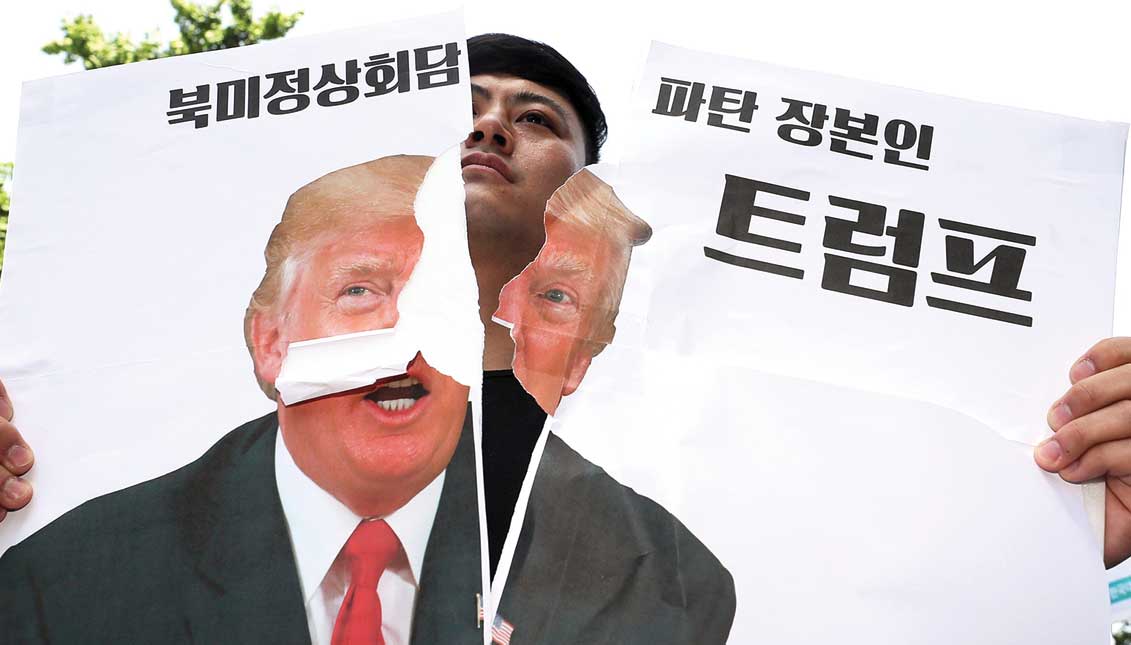
Impulsive presidency of Donald Trump will leave the U.S. without friends
The erratic foreign policy of the Trump Administration has been transformed into a constant oscillation of decisions that, before making it look like a power…
"Thus it is that in war the victorious strategist only seeks battle after the victory has been won, whereas he who is destined to defeat first fights and afterwards looks for victory," said Sun-Tzu, philosopher and military strategist of ancient China.
And in the White House, it seems that nobody ever read "The Art of War."
Between comings and goings, tug-of-war, and indecision driven by impulse, the Trump administration insists on badly choosing its battles, losing ground in international politics and giving the limelight in the world economy to antagonistic forces like China and Russia.
Only last Tuesday, President Trump announced that he was suspending the iconic meeting with North Korean leader Kim Jong Un, a meeting that promised to put two nations historically in a state of enmity at the same table.
That was the last decision in a chain of diplomatic disasters: the transfer of the Embassy to Jerusalem, the withdrawal of the Nuclear Agreement with Iran, the increase in tariffs on iron and steel, the abandonment of the Treaty of Paris...
For Richard North Patterson, writer and member of the Council on Foreign Relations, "suffusing these behaviors is a stunning inversion of wise diplomacy," he wrote in his column for the Huffington Post. "Quiet persistence, not noisy threats, cements enduring progress. A successful foreign policy is more often incremental than instantaneous - it seeks results, not attention. The perpetual self-contradictions of a mercurial president, addicted to the limelight erode the credibility required for global leadership."
The most alarming aspect of these "strategies" is precisely the insistence on breaking pacts without proposing solutions.
RELATED CONTENT
For Danielle Pletka of the American Enterprise Institute, "whenever you walk away from something, you have to have something to replace it," she said during a discussion on NPR. "(The Administration) talks a lot about the reimposition of sanctions. But there are too many people in Washington who don’t understand that sanctions are not a policy. Sanctions are a tool."
While Trump's attempts to reach a meeting "by force" with North Korea through sanctions seems an improvement in relations for many, others assume that it is a perpetuation of U.S. diplomatic errors for more than 20 years in The Middle East.
"U.S. President Donald Trump’s decision to withdraw from the Iran nuclear deal and relocating the U.S. Embassy in Israel to Jerusalem fits the pattern of steps the United States has taken in the region over the past two decades," explains Kiliç Bugra Kanat in his column for the Daily Sabah. "Since the invasion of Iraq in 2003, the U.S. administration began a process of going alone when necessary while underestimating and underemphasizing the significance of allies and alliances around the world."
And it is that the isolationism and secrecy of the Trump Era have its germs in previous administrations, where the omission of serious situations and the prioritization of political issues eroded the United States' reputation as a defender of freedoms.
"The Obama administration’s decision to withdraw from Iraq and the decision not to take any steps to stop the bloodshed in Syria was all done unilaterally by the administration in Washington," Kanat continues. "His change of heart about the operation of the U.S operation in Syria following the chemical weapons attack has become the zenith of U.S. unilateralism. There was no deliberation with allies and no consideration of the potential steps following the sudden change of mind. In each and every unilateral decision, the outcome was a prolonged conflict with no solution or no strategy".
Today, and despite the fact that the Trump administration has had the luck of a market with significant increases during its first year, the effects of its "disruptive" policies are too unpredictable, especially in economic matters.
"The unpredictable nature of the Trump Presidency takes away the shine. There is still the risk that Trump will follow an isolationist path and damage global growth," wrote Stuart Clark, manager of Guilter Multi-Asset for Investment Week. "While foreign policy negotiations have not yet led to a serious geopolitical incident, it is impossible to measure the extreme risk of a trade war or escalation of political-military tension."










LEAVE A COMMENT: